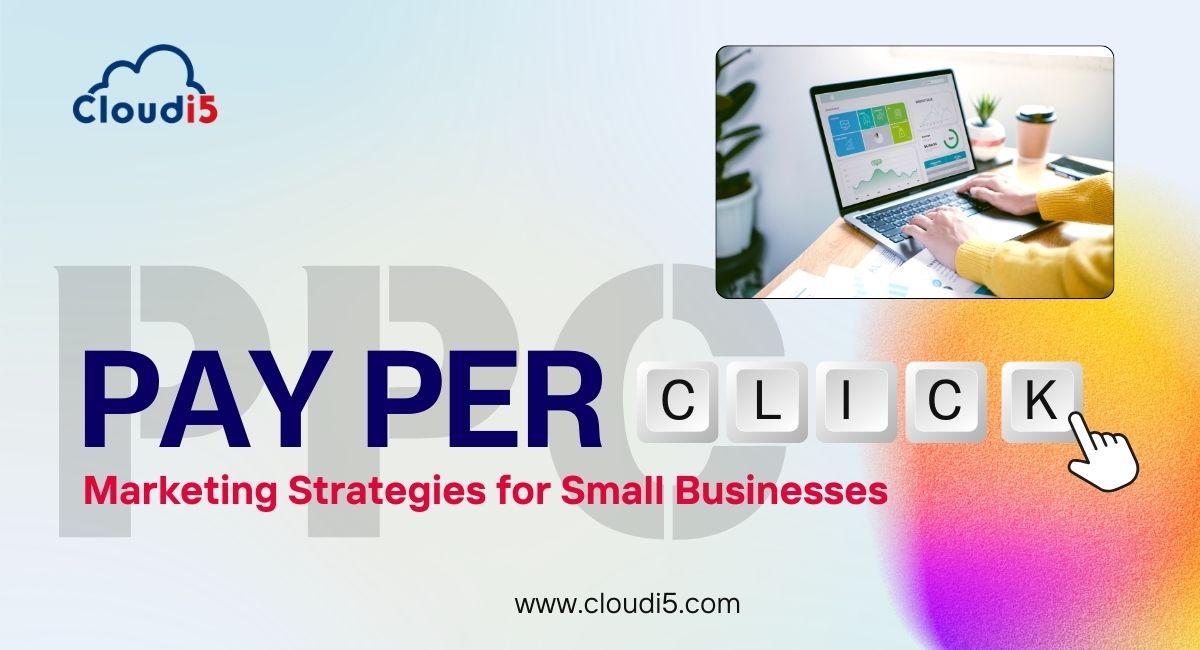
Effective Pay-Per-Click (PPC) Marketing Strategies For Small Businesses
Introduction to Pay-Per-Click (PPC) Marketing
What is PPC?
Pay-Per-Click (PPC) marketing is an online advertising model where businesses pay each time their ad is clicked. It’s a way for small businesses to drive traffic to their website quickly and efficiently by targeting specific keywords and audiences.
Why PPC is Important for Small Businesses
Pay-Per-Click (PPC) marketing strategies for small businesses are crucial for gaining immediate visibility and attracting potential customers. With well-targeted PPC campaigns, small businesses can compete with larger companies by appearing at the top of search results. PPC is a cost-effective way to generate leads, boost sales, and grow your small business online.
Setting Up a Successful Pay-Per-Click (PPC) Campaign
Choosing the Right Platform (Google Ads, Bing, etc.)
When setting up a Pay-Per-Click (PPC) campaign, selecting the right platform is crucial for the success of your PPC marketing strategies for small businesses. Here are a few options to consider:
- Google Ads: Offers a large audience reach and is the most popular platform for PPC campaigns.
- Bing Ads: A good alternative, especially for niche markets.
- Social Media Platforms (Facebook, Instagram, etc.): Great for targeting specific demographics and interests.
- Amazon Ads: Ideal for e-commerce businesses looking to target shoppers directly.
Defining Your Goals and Budget
For successful Pay-Per-Click (PPC) marketing strategies for small businesses, defining your goals and setting a clear budget is key:
- Set Clear Goals: Decide whether you want more website traffic, lead generation, or increased sales.
- Determine Your Budget: Establish a daily or monthly budget based on your campaign objectives.
- Monitor and Adjust: Regularly track performance to ensure your budget is being used effectively and adjust as needed.
- Optimize for ROI: Always aim to get the best return on investment (ROI) for your PPC campaigns by analyzing results and refining strategies.
Keyword Research for PPC
How to Choose the Best Keywords
Choosing the right keywords is essential for successful Pay-Per-Click (PPC) marketing strategies for small businesses. Keywords are the words or phrases that potential customers type into search engines when looking for your products or services. To choose the best keywords for your PPC campaigns:
- Think Like Your Customer: What words or phrases would your target audience use to find your business?
- Use Relevant Terms: Focus on keywords directly related to your products or services to improve the effectiveness of your Pay-Per-Click (PPC) marketing strategies for small businesses.
- Consider Search Intent: Target keywords that show a clear intention, like "buy shoes online" or "affordable digital marketing services," instead of more general terms like "shoes" or "marketing."
- Focus on Long-Tail Keywords: These are longer, more specific phrases that have lower competition and often result in higher conversions. For example, "affordable web design services for small businesses."
Tools for Keyword Research
There are many tools that can help you identify the best keywords for your Pay-Per-Click (PPC) marketing strategies for small businesses:
- Google Keyword Planner: A free tool that helps you find keywords and shows their search volume and competition, perfect for small businesses looking to improve their PPC campaigns.
- Ubersuggest: A simple tool that gives keyword suggestions and shows traffic potential for Pay-Per-Click (PPC) marketing strategies.
- SEMrush: A paid tool offering in-depth keyword research, competitive analysis, and suggestions, ideal for small businesses aiming to scale their PPC campaigns.
- Ahrefs: Another powerful paid tool that helps you discover keyword ideas and analyze competitor PPC strategies to enhance your own campaigns.
These tools are crucial for small businesses looking to improve their Pay-Per-Click (PPC) marketing strategies and ensure they are targeting the right audience to drive better results.
Creating Effective Pay-Per-Click (PPC) Ads for Small Businesses
Writing Compelling Ad Copy for PPC
To make your Pay-Per-Click (PPC) marketing strategies for small businesses work, your ad copy should be clear and simple. Tell people exactly what you’re offering and why it’s valuable. Use action words like "Shop Now" or "Learn More" to get users to click. Focus on how your product or service helps solve their problem. Including relevant keywords in your Pay-Per-Click (PPC) ad copy makes it more relevant to what users are searching for, making your ad more likely to be noticed.
Designing Eye-catching PPC Ads for Small Businesses
For your Pay-Per-Click (PPC) ads to stand out, keep the design simple and clean. Use bold, contrasting colors that grab attention while staying true to your brand. Keep the message clear and focused on one main idea. If you use images, make sure they are high-quality and related to your product. Also, since many people view ads on mobile devices, make sure your Pay-Per-Click (PPC) ads look good on phones and tablets, helping your small business reach more potential customers.
Optimizing Landing Pages for Conversions
1. Best Practices for Landing Page Design
To make your Pay-Per-Click (PPC) marketing strategies more effective, ensure your landing page is simple and focused.
- Keep the layout clean and easy to navigate.
- Use a clear headline that matches your ad’s message.
- Include a strong call-to-action (CTA) like "Sign Up Now" or "Get Started."
- Use high-quality images relevant to your offer.
- Make sure the page loads quickly to keep visitors engaged.
2. How to Improve Your Conversion Rate
Improving your conversion rate is essential to getting better results from your campaigns.
- Test different elements of your landing page, such as headlines and CTAs, to find what works best.
- Focus on one main goal per page to avoid distractions.
- Ensure your landing page is mobile-friendly, as many users browse on phones.
- Offer value, such as discounts or free resources, to encourage action.
- Use social proof, like testimonials or reviews, to build trust with visitors.
Pay-Per-Click (PPC) Marketing Strategies for Small Businesses
Pay-Per-Click (PPC) marketing strategies are a great way for small businesses to drive traffic and generate leads. With PPC, businesses only pay when a user clicks on their ad, making it a cost-effective way to reach potential customers. To make the most of PPC, small businesses can follow a few key strategies:
- Target the Right Audience: Choose the right keywords and use audience targeting features to ensure your ads are shown to people who are likely to be interested in your products or services.
- Set a Clear Budget: Decide how much you are willing to spend on your PPC campaign and adjust your budget according to your business goals. Start small and scale up as you see positive results.
- Write Compelling Ad Copy: Ensure your ad copy is clear, relevant, and includes a strong call-to-action (CTA). Focus on how your product or service solves a problem for your target audience.
- Optimize Landing Pages: Make sure your landing pages are designed to convert visitors into customers. A clear, focused layout with a strong CTA can help boost your conversion rate.
- Use Negative Keywords: Negative keywords prevent your ads from showing up in irrelevant searches, helping you save money by targeting only the most relevant audience.
By implementing these Pay-Per-Click (PPC) marketing strategies for small businesses, you can improve your online visibility, attract more qualified leads, and achieve a higher return on investment (ROI).
Tracking PPC Performance
To see how well your Pay-Per-Click (PPC) marketing strategies for small businesses are working, track key metrics like Click-Through Rate (CTR), Cost Per Click (CPC), Conversion Rate, and Return on Investment (ROI). CTR shows how often people click your ad, CPC tells you how much you pay for each click, Conversion Rate tracks how many clicks lead to actions, and ROI shows if you're making a profit from your PPC campaigns.
Adjusting Your PPC Campaign
Once you know your numbers, make changes to improve your Pay-Per-Click (PPC) marketing strategies for small businesses. If your CTR is low, try changing the ad copy. If conversions are low, improve your landing page. Adjust your keywords to make sure they match what people are searching for. Lastly, focus your budget on the ads that perform the best. These steps will help you improve your PPC campaigns and get better results for your small business.
Common PPC Mistakes to Avoid
Budget Overruns
One of the most common mistakes in Pay-Per-Click (PPC) campaigns is exceeding the budget. If you don’t set clear budget limits, you could end up spending more than you planned. To avoid this, set a daily or monthly budget and monitor it regularly to ensure you’re staying on track.
Targeting Issues
Another mistake is poor targeting. If your ads are shown to the wrong audience, you’ll waste money on clicks that don’t lead to conversions. Make sure you choose the right keywords and audience for your Pay-Per-Click (PPC) marketing strategies to reach people who are actually interested in your products or services.
Conclusion: Maximizing Your PPC Success
To maximize your Pay-Per-Click (PPC) success, focus on continuous optimization and learning from your campaign data. Set clear goals, monitor your performance regularly, and adjust your keywords, budget, and ad copy to improve results. For long-term PPC success, keep testing different strategies and refining your approach. Working with experts like Cloudi5 Technologies can help you create tailored PPC marketing strategies that drive better results and boost your business growth.
Trusted By












Leave Comments